- Home
- Dan Simmons
Song of Kali
Song of Kali Read online
Song of Kali
Dan Simmons
Fantasy Masterworks Volume 44
eGod
For HARLAN ELLISON, who has heard the song,
And for KAREN and JANE,who are my other voices.
" . . . there is a darkness. It is for everyone . . . Only some
Greeks and admirers of theirs, in their liquid noon, where the friend
ship of beauty to human things was perfect, thought they were clearly
divided from this darkness. And these Greeks too were in it. But still
they are the admiration of the rest of the mud-sprung, famine-knifed,
street-pounding, war-rattled, difficult, painstaking, kicked in the belly,
grief and cartilage mankind, the multitude, some under a coal-sucking
Vesuvius of chaos smoke, some inside a heaving Calcutta midnight,
who very well know where they are."
— Saul Bellow
"Why, this is Hell; nor am I out of it."
— Christopher Marlowe
Song of Kali
Some places are too evil to be allowed to exist. Some cities are too wicked to be suffered. Calcutta is such a place. Before Calcutta I would have laughed at such an idea. Before Calcutta I did not believe in evil — certainly not as a force separate from the actions of men. Before Calcutta I was a fool.
After the Romans had conquered the city of Carthage, they killed the men, sold the women and children into slavery, pulled down the great buildings, broke up the stones, burned the rubble, and salted the earth so that nothing would ever grow there again. That is not enough for Calcutta. Calcutta should be expunged.
Before Calcutta I took part in marches against nuclear weapons. Now I dream of nuclear mushroom clouds rising above a city. I see buildings melting into lakes of glass. I see paved streets flowing like rivers of lava and real rivers boiling away in great gouts of steam. I see human figures dancing like burning insects, like obscene praying mantises sputtering and bursting against a fiery red background of total destruction.
The city is Calcutta. The dreams are not unpleasant.
Some places are too evil to be allowed to exist.
1
"Today everything happens in Calcutta . . .
Who should I blame?"
— Sankha Ghosh
"Don't go, Bobby," said my friend. "It's not worth it."
It was June of 1977, and I had come down to New York from New Hampshire in order to finalize the details of the Calcutta trip with my editor at Harper's. Afterward I decided to drop in to see my friend Abe Bronstein. The modest uptown office building that housed our little literary magazine, Other Voices, looked less than impressive after several hours of looking down on Madison Avenue from the rarefied heights of the suites at Harper's.
Abe was in his cluttered office, alone, working on the autumn issue of Voices. The windows were open, but the air in the room was as stale and moist as the dead cigar that Abe was chewing on. "Don't go to Calcutta, Bobby," Abe said again. "Let someone else do it."
"Abe, it's all set," I said. "We're leaving next week." I hesitated a moment. "They're paying very well and covering all expenses," I added.
"Hnnn," said Abe. He shifted the cigar to the other side of his mouth and frowned at a stack of manuscripts in front of him. From looking at this sweaty, disheveled little man — more the picture of an overworked bookie than anything else — one would never have guessed that he edited one of the more respected "little magazines" in the country. In 1977, Other Voices hadn't eclipsed the old Kenyan Review or caused The Hudson Review undue worry about competition, but we were getting our quarterly issues out to subscribers; five stories that had first appeared in Voices had been chosen for the O. Henry Award anthologies; and Joyce Carol Oates had donated a story to our tenthanniversary issue. At various times I had been Other Voices assistant editor, poetry editor, and unpaid proofreader. Now, after a year off to think and write in the New Hampshire hills and with a newly issued book of verse to my credit, I was merely a valued contributor. But I still thought of Voices as our magazine. And I still thought of Abe Bronstein as a close friend.
"Why the hell are they sending you, Bobby?" asked Abe. "Why doesn't Harper's send one of its big guns if this is so important that they're going to cover expenses?"
Abe had a point. Not many people had heard of Robert C. Luczak in 1977, despite the fact that Winter Spirits had received half a column of review in the Times. Still, I hoped that what people — especially the few hundred people who counted — had heard was promising. "Harper's thought of me because of that piece I did in Voices last year," I said. "You know, the one on Bengali poetry. You said I spent too much time on Rabindranath Tagore."
"Yeah, I remember," said Abe. "I'm surprised that those clowns at Harper's knew who Tagore was."
"Chet Morrow called me," I said. "He said that he had been impressed with the piece." I neglected to tell Abe that Morrow had forgotten Tagore's name.
"Chet Morrow?" grunted Abe. "Isn't he busy doing novelizations of TV series?"
"He's filling in as temporary assistant editor at Harper's," I said. "He wants the Calcutta article in by the October issue."
Abe shook his head. "What about Amrita and little Elizabeth Regina . . . "
"Victoria," I said. Abe knew the baby's name. When I had first told him the name we'd chosen for our daughter, Abe had suggested that it was a pretty damn WASPy title for the offspring of an Indian princess and a Chicago pollock. The man was the epitome of sensitivity. Abe, although well over fifty, still lived with his mother in Bronxville. He was totally absorbed in putting out Voices and seemed indifferent to anything or anyone that didn't directly apply to that end. One winter the heat had gone out in the office, and he had spent the better part of January here working in his wool coat before getting around to having it fixed. Most of Abe's interactions with people these days tended to be over the phone or through letters, but that didn't make the tone of his comments any less acerbic. I began to see why no one had taken my place as either assistant editor or poetry editor. "Her name's Victoria," I said again.
"Whatever. How does Amrita feel about you going off and deserting her and the kid? How old's the baby, anyway? Couple months?"
"Seven months old," I said.
"Lousy time to go off to India and leave them," said Abe.
"Amrita's going too," I said. "And Victoria. I convinced Morrow that Amrita could translate the Bengali for me." This was not quite the truth. It had been Morrow who suggested that Amrita go with me. In fact, it was probably Amrita's name that had gotten me the assignment. Harper's had contacted three authorities on Bengali literature, two of them Indian writers living in the States, before calling me. All three had turned down the assignment, but the last man they contacted had mentioned Amrita — despite her field being mathematics, not writing — and Morrow had followed up on it. "She does speak Bengali, doesn't she?" Morrow had asked over the phone. "Sure," I'd said. Actually, Amrita spoke Hindi, Marathi, Tamil, and a little Punjabi as well as German, Russian, and English, but not Bengali. Close enough, I'd thought.
"Amrita wants to go?" asked Abe.
"She's looking forward to it," I said. "She hasn't been back to India since her father moved the family to England when she was seven. She's also looking forward to our spending some time in London on the way to India so her parents can meet Victoria." This last part was true. Amrita had not wanted to go to Calcutta with the baby until I convinced her that it was important to my career. The stopover in London had been the deciding factor for her.
"Okay," grunted Abe. "Go to Calcutta." His tone of voice let me know precisely what he thought of the idea.
"Tell me why you don't want me to," I said.
"Later," said Abe. "
Right now tell me about this Das thing Morrow's talking about. And I'd like to know why you want me to save half of next spring's issue of Voices for more Das stuff. I hate reprints, and there can't be ten lines of his verse that hasn't been printed and reprinted ad nauseum."
"Das, yes," I said. "But not reprints. New things."
"Tell me," said Abe.
I told him.
"I'm going to Calcutta to find the poet M. Das," I said. "Find him, talk to him, and bring back some samples of his new work for publication."
Abe stared at me. "Uh-uh," he said. "No way. M. Das is dead. He died six or seven years ago. In 1970, I think."
"July of 1969," I said. I could not keep a trace of smugness out of my voice. "He disappeared in July of 1969 while on his way back from his father's funeral, cremation actually, in a village in East Pakistan — Bangladesh now — and everyone assumed he was murdered."
"Yeah, I remember," said Abe. "I stayed with you and Amrita for a couple of days in your Boston apartment when the New England Poets' Alliance held that commemorative reading for him. You read some of Tagore's stuff, and excerpts from Das's epic poems about what'shername, the nun — Mother Teresa."
"And two of my Chicago Cycle pieces were dedicated to him," I said. "But I guess we were all a bit premature. Das seems to have resurfaced in Calcutta, or at least some of his new poetry and correspondence has. Harper's got some samples through an agency they work with there, and people who knew Das say that he definitely wrote these new things. But nobody's seen the man himself. Harper's wants me to try to get some of his new work, but the slant of the article is going to be 'The Search for M. Das,' that kind of crap. Now here's the good news. Harper's gets first refusal on any of the poetry I get rights to, but we can print the rest in Other Voices."
"Sloppy seconds," grumbled Abe and chewed on his cigar. This was the kind of enthusiastic gratitude I'd grown used to during my years with Bronstein. I said nothing, and eventually he spoke again. "So where the hell's Das been for eight years, Bobby?"
I shrugged and tossed him a photocopied page that Morrow had given me. Abe inspected it, held it at arm's length, turned it sideways like a centerfold, and tossed it back. "I give up," he said. "What the shit is it?"
"That's the fragment of a new poem that Das is supposed to have written within the past couple of years."
"What's it in, Hindi?"
"No, Sanskrit and Bengali, mostly. Here's the English translation." I handed over the other photocopy.
Abe's sweaty brow furrowed as he read. "Sweet Christ, Bobby, is this what I'm holding the spring issue for? This is about some dame screwing doggiestyle while drinking the blood of a headless man. Or did I miss something?"
"Nope. That's about it. Of course there are only a few stanzas in that fragment," I said. "And it's a rough translation."
"I thought Das's work was lyrical and sentimental. Sort of the way you described Tagore's stuff in your article."
"He was. He is. Not sentimental but optimistic." It was the same phrase I'd used many times to defend Tagore. Hell, it was the same phrase I'd used to defend my own work.
"Uh-huh," said Abe. "Optimistic. I like this optimistic part here — 'Kama Rati kamé / viparita karé rati.' According to the translator's copy it means — 'Maddened by lust, Kama and Rati fuck like dogs.' Sweet. It has a distinctive lilt to it, Bobby. Sort of early Robert Frost–ish."
"It's part of a traditional Bengali song," I said. "Notice how Das had embedded the rhythm of it in the general passage. He shifts from classical Vedic form to folk-Bengali and then back to Vedic. It's a complicated stylistic treatment, even allowing for translation." I shut up. I was just repeating what Morrow had told me, and he had been repeating what one of his "experts" had said. It was very hot in the little room. Through the open windows came the lulling sound of traffic and the somehow reassuring cry of a distant siren. "You're right," I said. "It doesn't sound like Das at all. It's almost impossible to believe that this is from the same man who wrote the Mother Teresa epic. My guess is that Das isn't alive and that this is some sort of scam. I don't know, Abe."
Abe pushed back in his swivel chair, and I thought for a second that he actually was going to remove the cigar stub from his mouth. Instead he scowled, rotated the cigar left and then right, leaned back in his chair, and clasped his stubby fingers behind his neck. "Bobby, did I ever tell you about the time I was in Calcutta?"
"No." I blinked in surprise. Abe had traveled widely as a wire-service reporter before he wrote his first novel, but he rarely talked about those days. After he had accepted my Tagore piece, he idly mentioned that he once had spent nine months with Lord Mountbatten in Burma. His stories about his wire-service days were rare but invariably enjoyable. "Was it during the war?" I asked.
"No. Right after. During the Hindu-Muslim partition riots in '47. Britain was pulling out, carving India into two countries and leaving the two religious groups to slaughter each other. That was all before your time, wasn't it, Roberto?"
"I've read about it, Abe. So you went to Calcutta to report the riots?"
"Nope. People didn't want to read about any more fighting right then. I went to Calcutta because Gandhi . . . Mohandas, not Indira . . . Gandhi was going there and we were covering him. Man of Peace, Saint in a Loincloth, the whole schtick. Anyway, I was in Calcutta for about three months." Abe paused and ran a hand through his thinning hair. He seemed at a loss for words. I'd never seen Abe hesitate a second in using language — written, spoken, or shouted. "Bobby," he said at last, "do you know what the word miasma means?"
"A poisonous atmosphere," I said. It nettled me to be quizzed. "As from a swamp. Or any noxious influence. Probably comes from the Greek miainein, meaning 'to pollute.'"
"Yeah," said Abe and rotated his cigar again. He took no notice of my little performance. Abe Bronstein expected his former poetry editor to know his Greek. "Well, the only word that could describe Calcutta to me then . . . or now . . . was miasma. I can't even hear one word without thinking of the other."
"It was built on a swamp," I said, still irritated. I wasn't used to hearing this kind of garbage from Abe. It was like having your reliable old plumber suddenly break into a discourse on astrology. "And we'll be going there during the monsoon season, which isn't the most pleasant time of the year, I guess. But I don't think — "
"I wasn't talking about the weather," said Abe. "Although it's the hottest, most humid, most miserable goddamn hellhole I've ever been in. Worse than Burma in '43. Worse than Singapore in typhoon weather. Jesus, it's worse than Washington in August. No, Bobby, I'm talking about the place, goddammit. There was something . . . something miasmal about that city. I've never been in a place that seemed as mean or shitty, and I've spent time in some of the great sewer cities of the world. Calcutta scared me, Bobby."
I nodded. The heat had caused a headache to start throbbing behind my eyes. "Abe, you've just spent time in the wrong cities," I said lightly. "Try spending a summer in North Philadelphia or on the Southside of Chicago where I grew up. That'll make Calcutta look like Fun City"
"Yeah," said Abe. He wasn't looking at me anymore. "Well, it wasn't just the city. I wanted out of Calcutta so my bureau chief — a poor schmuck who died of cirrhosis of the liver a couple of years later . . . this jerk gives me an assignment to cover a bridge dedication way out in the boonies of Bengal somewhere. I mean, there wasn't even a railroad line there yet, just this damn bridge connecting one patch of jungle to another across a river about two hundred yards wide and three inches deep. But the bridge had been built with some of the first postwar aid money sent from the States, so I had to go cover the dedication." Abe paused and looked out the window. From somewhere down the street came angry shouts in Spanish. Abe did not seem to hear them. "So anyway, it was pretty dull. The engineers and construction crew had already left, and the dedication was the usual mixture of politics and religion that you always get in India. It was too late to start back by jeep that evening — I was in no hurry
to get back to Calcutta, anyway — so I stayed in a little guest house on the edge of the village. It was probably left over from British inspection tours during the Raj. But it was so damn hot that night — one of those times when the sweat won't even drip, it just beads on your skin and hangs in the air — and the mosquitoes were driving me crazy; so sometime after midnight I got up and walked down to the bridge. I smoked a cigarette and headed back. If it hadn't been for the moon I wouldn't have seen it."
Abe took the cigar out of his mouth. He grimaced as if it tasted as foul as it looked. "The kid couldn't have been much more than ten, maybe younger," he said. "He'd been impaled on some iron reinforcement rods sticking up out of the cement abutment on the west side of the bridge. You could tell that he hadn't died right away; that he'd struggled for some time after the rods went through him — "

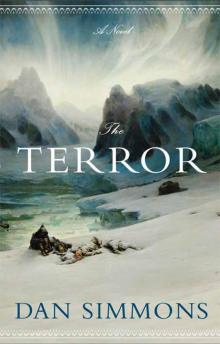 The Terror
The Terror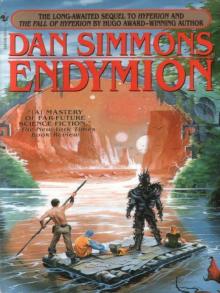 Endymion
Endymion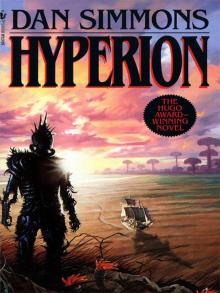 Hyperion
Hyperion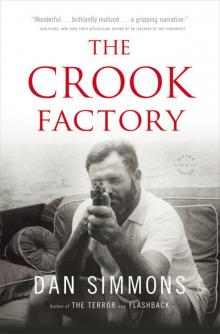 The Crook Factory
The Crook Factory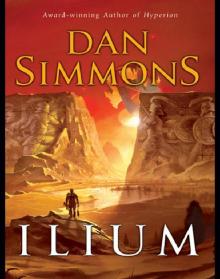 Ilium
Ilium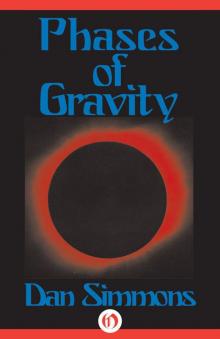 Phases of Gravity
Phases of Gravity Hardcase
Hardcase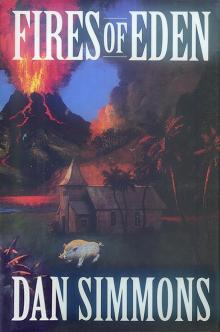 Fires of Eden
Fires of Eden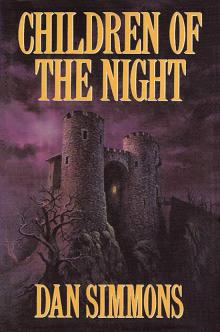 Children of the Night
Children of the Night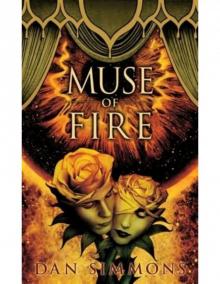 Muse of Fire
Muse of Fire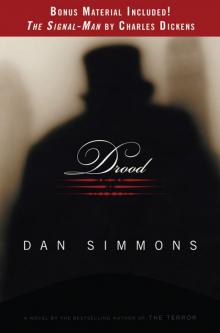 Drood
Drood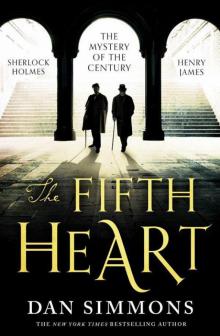 The Fifth Heart
The Fifth Heart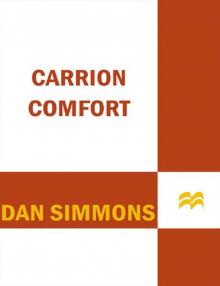 Carrion Comfort
Carrion Comfort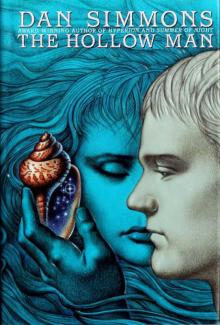 The Hollow Man
The Hollow Man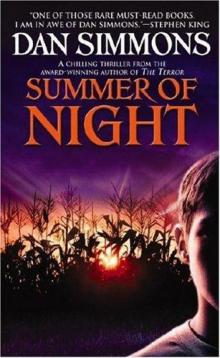 Summer of Night
Summer of Night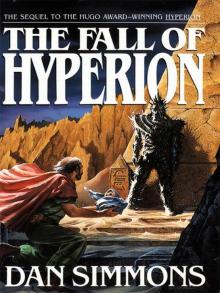 The Fall of Hyperion
The Fall of Hyperion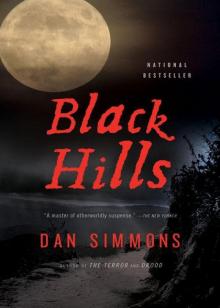 Black Hills
Black Hills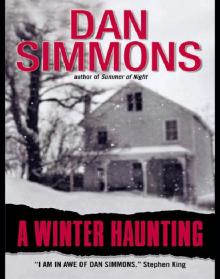 A Winter Haunting
A Winter Haunting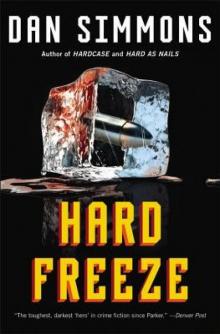 Hard Freeze
Hard Freeze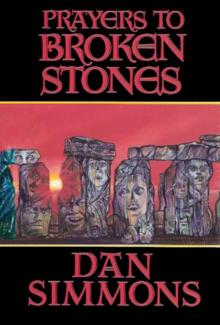 Prayers to Broken Stones
Prayers to Broken Stones Hard as Nails
Hard as Nails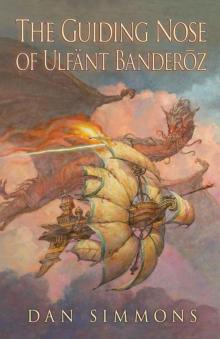 The Guiding Nose of Ulfant Banderoz
The Guiding Nose of Ulfant Banderoz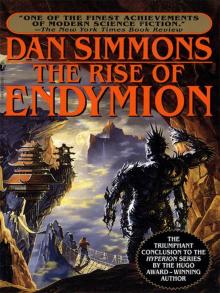 The Rise of Endymion
The Rise of Endymion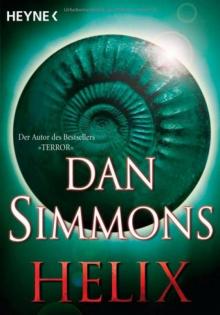 Orphans of the Helix
Orphans of the Helix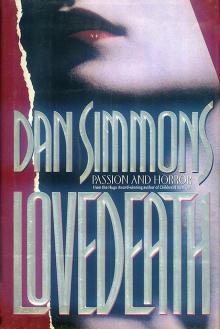 Lovedeath
Lovedeath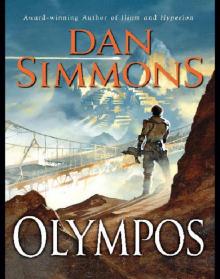 Olympos
Olympos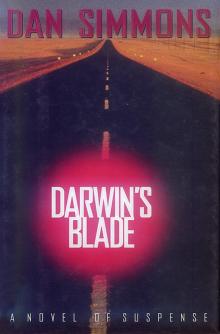 Darwin's Blade
Darwin's Blade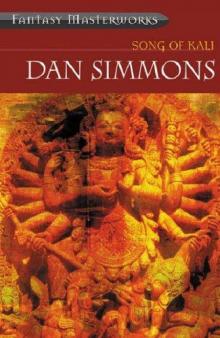 Song of Kali
Song of Kali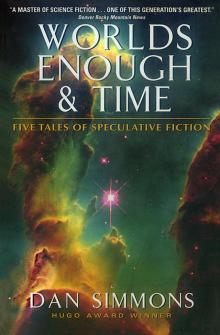 Worlds Enough & Time: Five Tales of Speculative Fiction
Worlds Enough & Time: Five Tales of Speculative Fiction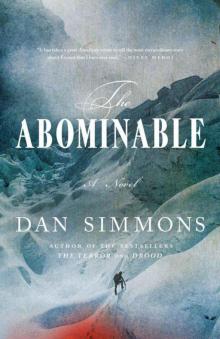 The Abominable
The Abominable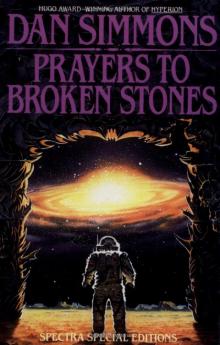 The Death of the Centaur
The Death of the Centaur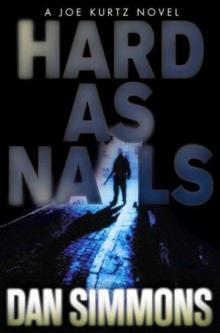 Hard as Nails jk-3
Hard as Nails jk-3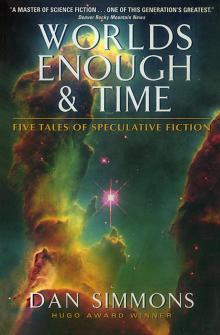 Worlds Enough & Time
Worlds Enough & Time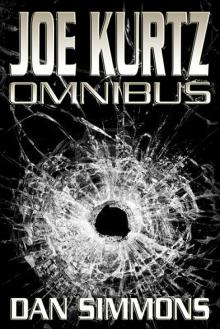 Joe Kurtz Omnibus
Joe Kurtz Omnibus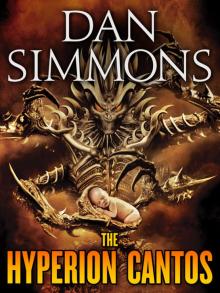 The Hyperion Cantos 4-Book Bundle
The Hyperion Cantos 4-Book Bundle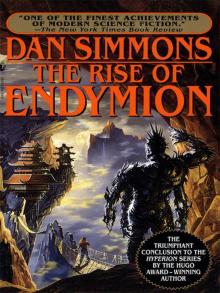 Rise of Endymion
Rise of Endymion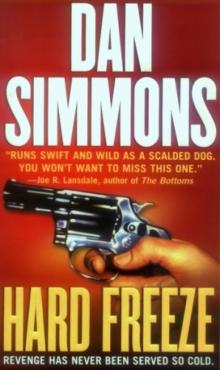 Hard Freeze jk-2
Hard Freeze jk-2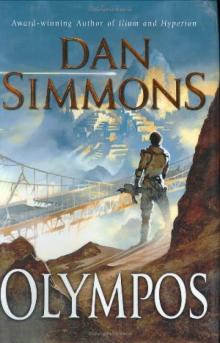 Olympos t-2
Olympos t-2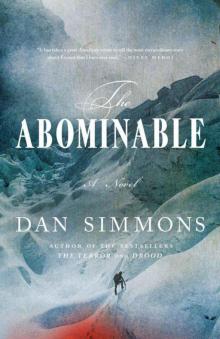 The Abominable: A Novel
The Abominable: A Novel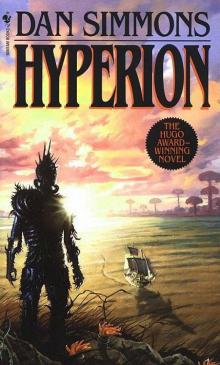 Hyperion h-1
Hyperion h-1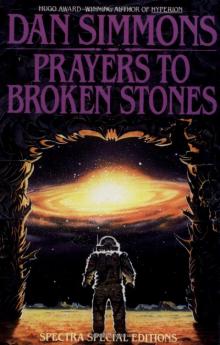 Remembering Siri
Remembering Siri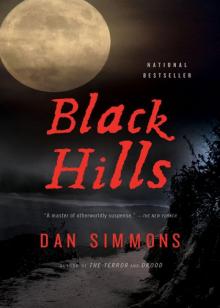 Black Hills: A Novel
Black Hills: A Novel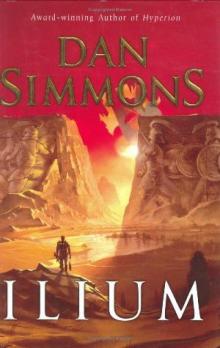 Ilium t-1
Ilium t-1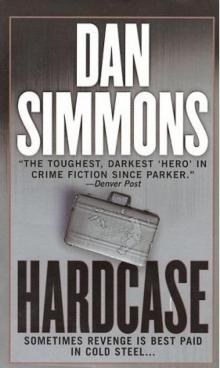 Hardcase jk-1
Hardcase jk-1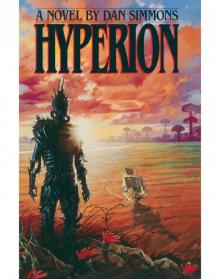 Hyperion 01 - Hyperion
Hyperion 01 - Hyperion